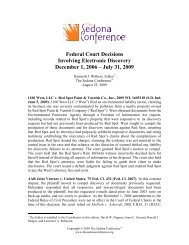Chambers Handbook for Judges - Federal Judicial Center
Chambers Handbook for Judges - Federal Judicial Center
Chambers Handbook for Judges - Federal Judicial Center
Create successful ePaper yourself
Turn your PDF publications into a flip-book with our unique Google optimized e-Paper software.
involved by scheduling times and places <strong>for</strong> discovery activities and<br />
otherwise monitoring and supervising such proceedings.<br />
A variety of motions may arise as a result of discovery proceedings,<br />
including those<br />
• to compel answers or other compliance with discovery rules;<br />
• to obtain protective orders against undue harassment, unreasonable<br />
demands, or disclosure of confidential or protected in<strong>for</strong>mation;<br />
• to obtain additional time to comply with discovery requests;<br />
• to terminate a deposition;<br />
• to pose objections to written interrogatories or other discovery<br />
requests; and<br />
• to impose sanctions <strong>for</strong> failure to comply with discovery requests.<br />
<strong>Federal</strong> Rule of Civil Procedure 26 prescribes general rules governing<br />
discovery. Amendments to Rule 26 that went into effect on December<br />
1, 1993, require parties to disclose to each other certain types of<br />
in<strong>for</strong>mation without waiting <strong>for</strong> a <strong>for</strong>mal discovery request. These disclosures<br />
must be exchanged prior to the initial Rule 16 conference. The<br />
amended rule also requires parties to confer prior to the initial Rule 16<br />
conference to develop a discovery plan, which they must submit to the<br />
court prior to the conference. Amended Rule 26 permits each district<br />
court and individual judge to decide whether to apply certain of its<br />
disclosure requirements to cases filed in that court or be<strong>for</strong>e that judge.<br />
Many of the discovery rules amended in 1993 allow exceptions to be<br />
made by local rule, agreement of the parties, or court order. <strong>Chambers</strong><br />
staff should discuss with their judge which rules apply in their court.<br />
In many courts, all motions pertaining to discovery are referred to a<br />
magistrate judge, as is responsibility <strong>for</strong> overseeing discovery procedures<br />
and ruling on discovery motions. The magistrate judge’s orders may be<br />
appealed to the district judge.<br />
38 <strong>Chambers</strong> <strong>Handbook</strong> <strong>for</strong> <strong>Judges</strong>’ Law Clerks and Secretaries

















